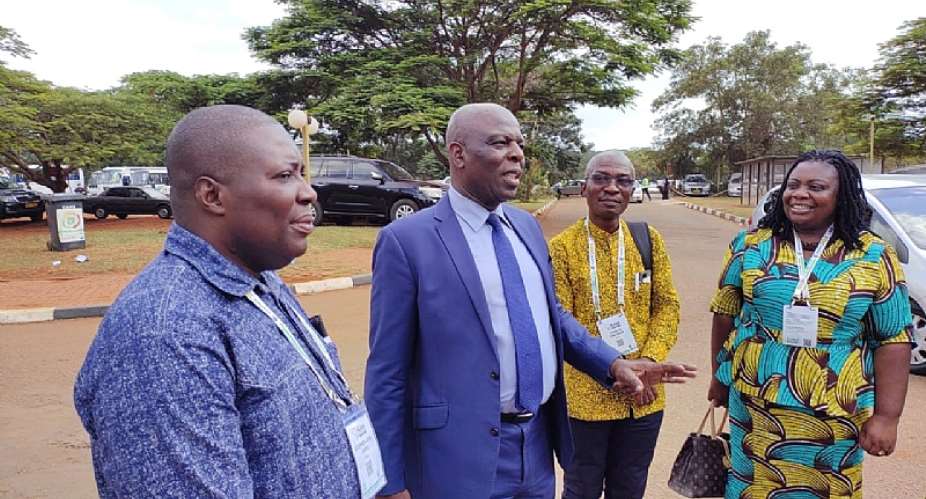Dr. Stephen Ayisi Addo, Programme Director, of the National AIDS/STI Control Programme (NACP) of Ghana, says the nation has made significant progress in the fight against HIV and AIDS.
He revealed that as of 2022, the HIV population in Ghana was 350,000, out of which 254,753 knew their status, with 222,581 on treatment, 97,630 virally suppressed, and 9,400 AIDS-related deaths in 2021.
On the new infection, Dr. Ayisi Addo said the country recorded 17,000 in 2022, stressing that Ghana’s HIV prevalence depicts a generalised epidemic.
Dr. Ayisi Addo, presenting “Monitoring and use of data to improve differentiated HIV testing services in Ghana,” at the ongoing 22nd edition of the International Conference on Aids and Sexually Transmitted Infections in Africa (ICASA) in Harare, Zimbabwe, noted that Ghana is making steady progress.
Dr. Ayisi Addo was among a team of HIV Health Experts who dissected the World Health Organisation’s (WHO) Differentiated Service Delivery (DSD) based on country-specific implementation experiences at the 2023 ICASA.
The experts expanded country-specific implementation initiatives to ensure that all people with HIV have access to differentiated service delivery models to simplify HIV care, including 6-month Multi-Month Dispensing (MMD) for children and adolescents.
Ghana’s Ambassador to Zimbabwe, Mr. Alexander Grant Ntrakwa, who is a career diplomat with extensive experience in multilateral diplomacy, was among the high-profile personalities who attended the session.
Dr. Ayisi Addo said in 2016, the National AIDS/STI Control Programme (NACP) adopted the new WHO recommendations to treat all people living with HIV with ART, regardless of immune status or clinical stage.
He explained that DSD describes how services may be adapted to reflect the
clients’ needs and preferences, as well as reducing the burden of care for healthcare workers.
He said such adaptations may be made across the cascade of HIV care from
testing to virological suppression, including the adaptation of services to specific populations.
Dr. Ayisi Addo said the NACP has endorsed the models of service delivery; however, the choice of model in any given district will ultimately be decided after analysis of local data and an assessment of challenges being faced by both healthcare workers and clients.
Decentralised drug distribution (DDD) and services designed to improve antiretroviral therapy (ART) coverage and continuity for different demographic and risk groups and to integrate with national health systems and services were also discussed.
The experts who presented the country report are Dr. Sivile Suilanji, National HIV Technical Advisor, Zambia; and Ms. Hiwot Haile-Selassie, Consultant, Strategic Information, Analytics, and Use Unit, Global HIV, Hepatitis, and STI Programme, WHO Headquarters.
The panellists who joined in the discussion were Jean Berchmans, Programme Monitoring, Evaluation, and Resources Mobilisation Officer, Rwanda Network of People Living with HIV/AIDS (RRP+); Dr. Amir Shroufi, Senior HIV Advisor, The Global Fund; and it was moderated by Ms. Celine Lastrucci, DSD Technical Officer Testing, Prevention, and Populations Unit, Global HIV, Hepatitis, and STI Programme WHO Headquarters.
The other speakers and panellists encouraged healthcare workers and patients to work together to achieve the goals of ending HIV and AIDS.
The ICASA 2023, which started on December 4 and is expected to end on Saturday, December 9th, is on the general theme “AIDS is not over: Address inequalities, accelerate inclusion, and innovate."
It is being organised by the Society for AIDS in Africa in collaboration with the government of Zimbabwe and other partners, including the World Health Organisation, the Global Fund, and others.
-CDA Consult || Contributor






 List of 24 ministerial nominees approved by Parliament
List of 24 ministerial nominees approved by Parliament
 You were my inspiration, made me who I am today – Lilian Kumah
You were my inspiration, made me who I am today – Lilian Kumah
 Rainstorm destroys Hohoe E.P. Senior High School building
Rainstorm destroys Hohoe E.P. Senior High School building
 John Kumah strongly supported me to become NPP flagbearer – Bawumia reveals
John Kumah strongly supported me to become NPP flagbearer – Bawumia reveals
 Late John Kumah urged me to run for NPP flagbearer, strongly supported me — Bawu...
Late John Kumah urged me to run for NPP flagbearer, strongly supported me — Bawu...
 Akufo-Addo appoints Joseph Kpemka as Deputy MD of BOST
Akufo-Addo appoints Joseph Kpemka as Deputy MD of BOST
 Ablakwa petitions CHRAJ to investigate sale of SSNIT's hotels to Rock City Hotel
Ablakwa petitions CHRAJ to investigate sale of SSNIT's hotels to Rock City Hotel
 MoF to provide new bailout for defunct Gold Coast Fund investors – Bawumia revea...
MoF to provide new bailout for defunct Gold Coast Fund investors – Bawumia revea...
 OMCs implement price adjustments despite International petroleum price declines
OMCs implement price adjustments despite International petroleum price declines
 Petition to remove Kissi Agyebeng will disrupt operations of OSP – Martin Kpebu
Petition to remove Kissi Agyebeng will disrupt operations of OSP – Martin Kpebu
